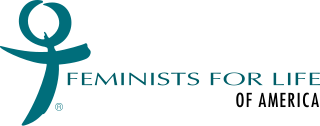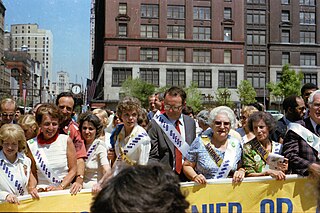Feminism is a range of socio-political movements and ideologies that aim to define and establish the political, economic, personal, and social equality of the sexes. Feminism holds the position that societies prioritize the male point of view and that women are treated unjustly in these societies. Efforts to change this include fighting against gender stereotypes and improving educational, professional, and interpersonal opportunities and outcomes for women.
Radical feminism is a perspective within feminism that calls for a radical re-ordering of society in which male supremacy is eliminated in all social and economic contexts, while recognizing that women's experiences are also affected by other social divisions such as in race, class, and sexual orientation. The ideology and movement emerged in the 1960s.
Difference feminism is a term developed during the equality-versus-difference debate in American feminism to describe the view that men and women are different, but that no value judgment can be placed upon them and both sexes have equal moral status as persons.

Carol J. Adams is an American writer, feminist, and animal rights advocate. She is the author of several books, including The Sexual Politics of Meat: A Feminist-Vegetarian Critical Theory (1990) and The Pornography of Meat (2004), focusing in particular on what she argues are the links between the oppression of women and that of non-human animals. She was inducted into the Animal Rights Hall of Fame in 2011.
Liberal feminism, also called mainstream feminism, is a main branch of feminism defined by its focus on achieving gender equality through political and legal reform within the framework of liberal democracy and informed by a human rights perspective. It is often considered culturally progressive and economically center-right to center-left. As the oldest of the "Big Three" schools of feminist thought, liberal feminism has its roots in 19th century first-wave feminism seeking recognition of women as equal citizens, focusing particularly on women's suffrage and access to education, the effort associated with 19th century liberalism and progressivism. Liberal feminism "works within the structure of mainstream society to integrate women into that structure." Liberal feminism places great emphasis on the public world, especially laws, political institutions, education and working life, and considers the denial of equal legal and political rights as the main obstacle to equality. As such liberal feminists have worked to bring women into the political mainstream. Liberal feminism is inclusive and socially progressive, while broadly supporting existing institutions of power in liberal democratic societies, and is associated with centrism and reformism. Liberal feminism tends to be adopted by white middle-class women who do not disagree with the current social structure; Zhang and Rios found that liberal feminism with its focus on equality is viewed as the dominant and "default" form of feminism. Liberal feminism actively supports men's involvement in feminism and both women and men have always been active participants in the movement; progressive men had an important role alongside women in the struggle for equal political rights since the movement was launched in the 19th century.
he history of feminism comprises the narratives of the movements and ideologies which have aimed at equal rights for women. While feminists around the world have differed in causes, goals, and intentions depending on time, culture, and country, most Western feminist historians assert that all movements that work to obtain women's rights should be considered feminist movements, even when they did not apply the term to themselves. Some other historians limit the term "feminist" to the modern feminist movement and its progeny, and use the label "protofeminist" to describe earlier movements.

Ms. is an American feminist magazine co-founded in 1971 by journalist and social/political activist Gloria Steinem. It was the first national American feminist magazine. The original editors were Letty Cottin Pogrebin, Mary Thom, Patricia Carbine, Joanne Edgar, Nina Finkelstein, Mary Peacock, Margaret Sloan-Hunter, and Gloria Steinem. Beginning as a one-off insert in New York magazine in 1971, the first stand-alone issue of Ms. appeared in January 1972, with funding from New York editor Clay Felker. It was intended to appeal to a wide audience and featured articles about a variety of issues related to women and feminism. From July 1972 until 1987, it was published on a monthly basis. It now publishes quarterly.

Third-wave feminism is a feminist movement that began in the early 1990s, prominent in the decades prior to the fourth wave. Grounded in the civil-rights advances of the second wave, Gen X third-wave feminists born in the 1960s and 1970s embraced diversity and individualism in women, and sought to redefine what it meant to be a feminist. The third wave saw the emergence of new feminist currents and theories, such as intersectionality, sex positivity, vegetarian ecofeminism, transfeminism, and postmodern feminism. According to feminist scholar Elizabeth Evans, the "confusion surrounding what constitutes third-wave feminism is in some respects its defining feature."

Bitch was an independent, quarterly alternative magazine published in Portland, Oregon. Its tagline described it as a "feminist response to pop culture", and it was described in 2008 by Columbia Journalism Review as "a respected journal of cultural discourse". As a feminist publication, it took an intersectional approach.

Feminists for Life of America (FFL) is a non-profit, anti-abortion feminist, non-governmental organization (NGO). Established in 1972, and now based in Alexandria, Virginia, the organization publishes a biannual magazine, The American Feminist, and aims to reach young women, college students in particular.
Cultural feminism is a term used to describe a variety of feminism that attempts to revalue and redefine attributes culturally ascribed to femaleness. It is also used to describe theories that commend innate differences between women and men.

Roberta Kalechofsky was an American writer, feminist and animal rights activist, focusing on the issue of animal rights within Judaism and the promotion of vegetarianism within the Jewish community. She was the founder of Jews for Animal Rights and Micah Publications or Micah Books, which specializes in the publication of animal rights, Jewish vegetarianism, and Holocaust literature.
The feminist sex wars, also known as the lesbian sex wars, sex wars or porn wars, are terms used to refer to collective debates amongst feminists regarding a number of issues broadly relating to sexuality and sexual activity. Differences of opinion on matters of sexuality deeply polarized the feminist movement, particularly leading feminist thinkers, in the late 1970s and early 1980s and continue to influence debate amongst feminists to this day.

Merle Hoffman is an American journalist and activist.
Joan Dunayer is an American philosopher and abolitionist animal rights advocate. She is the author of two books, Animal Equality (2001) and Speciesism (2004). She has argued for "species equality" the view that all animals including insects should be given rights.
Feminism is one theory of the political, economic, and social equality of the sexes, even though many feminist movements and ideologies differ on exactly which claims and strategies are vital and justifiable to achieve equality.
Marti Kheel was a vegan ecofeminist activist scholar credited with founding Feminists for Animal Rights (FAR) in California in 1982. She authored several books in deep ecology and ecofeminism, including Nature Ethics: An Ecofeminist Perspective and several widely cited articles in college courses and related scholarship, such as "The Liberation of Nature: A Circular Affair", "From Heroic to Holistic Ethics: The Ecofeminist Challenge", and "From Healing Herbs to Deadly Drugs: Western Medicine's War Against the Natural World". She was a long-time vegan in diet, lifestyle, and philosophical commitments, working out her understanding of its implications in every area of our human relationships with nature and its constituents, and she found a wide audience for those deep reflections. Reportedly, she had pursued a raw vegan diet later in her life. Her pioneering scholarship in ecofeminist ethics is foundational for continuing work in these fields.

The personal is political, also termed The private is political, is a political argument used as a rallying slogan of student movement and second-wave feminism from the late 1960s. In the context of the feminist movement of the 1960s and 1970s, it was a challenge to the nuclear family and family values. The phrase was popularized by the publication of a 1969 essay by feminist activist Carol Hanisch under the title "The Personal Is Political" in 1970, and has been repeatedly described as a defining characterization of second-wave feminism, radical feminism, women's studies, or feminism in general. It has also been used by some women artists as the underlying philosophy for their art practice.

Ecofeminism is a branch of feminism and political ecology. Ecofeminist thinkers draw on the concept of gender to analyse the relationships between humans and the natural world. The term was coined by the French writer Françoise d'Eaubonne in her book Le Féminisme ou la Mort (1974). Ecofeminist theory asserts a feminist perspective of Green politics that calls for an egalitarian, collaborative society in which there is no one dominant group. Today, there are several branches of ecofeminism, with varying approaches and analyses, including liberal ecofeminism, spiritual/cultural ecofeminism, and social/socialist ecofeminism. Interpretations of ecofeminism and how it might be applied to social thought include ecofeminist art, social justice and political philosophy, religion, contemporary feminism, and poetry.









